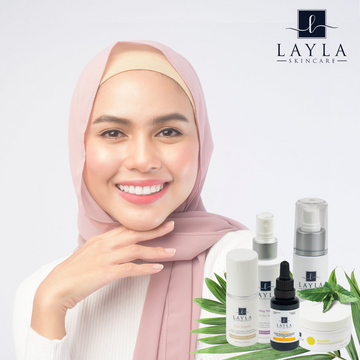Frequently Asked Questions
Why switch to Layla Skincare?
Choosing Layla Skincare means prioritising your health and well-being by using products free from harmful chemicals like parabens and silicones. These chemicals can have long-term negative effects on our bodies. Additionally, many skincare products on the market include artificial and synthetic perfumes that, while they may smell pleasant, offer no real benefits for your skin. In fact, the addition of perfumes can often diminish the natural goodness of the ingredients, reducing the effectiveness of the product.
At Layla Skincare, we focus on delivering products that are beneficial for their carefully selected natural ingredients, not just their fragrance. With the rise in allergies and sensitivities, it's more important than ever to choose skincare that truly nurtures and supports your skin's health—free from unnecessary additives and designed to deliver real, lasting results.
Are Your Products 100% Australian Made?
All our ingredients are proudly sourced within Australia, and we are honoured to carry the Australian Made ‘Kangaroo’ logo. This is testament to the verified origin of each ingredient and our commitment to supporting local resources. Australian ingredients are packed with natural goodness, and Australian botanicals offer numerous benefits for the skin, including hydration, nourishment, and protection. Our products celebrate the richness of Australian nature while ensuring the highest quality and sustainability.
Is Layla Skincare 100% vegan?
All Layla Skincare products are proudly 100% vegan, meaning they contain no animal-derived ingredients. Choosing vegan skincare is beneficial for both you and the environment. By using plant-based ingredients, we ensure our products are gentle and suitable for all skin types.
Are Layla Skincare Products Cruelty-Free?
We are proudly 100% cruelty-free. We never test our products on animals, and we ensure that our suppliers adhere to the same cruelty-free principles. Choosing cruelty-free skincare helps protect countless animals from unnecessary suffering and promotes ethical practices in the beauty industry.
Can Layla Skincare Products Be Used During Pregnancy?
Yes, Layla Skincare products are safe to use during pregnancy. However, we recommend taking a few precautions to ensure your safety and comfort. Perform a patch test before regular use, as skin sensitivity can change during pregnancy. Additionally, please review the full list of ingredients for each product to ensure there are no potential allergens you might react to. If you have any concerns or specific conditions, we strongly advise consulting your doctor or dermatologist for personalized advice. Your well-being is our top priority.
Do Layla Skincare products contain preservatives?
We use a variety of plant-based preservatives, carefully selected based on the product, including Australian botanicals, vitamin E, antioxidants, and naturally occurring benzyl alcohol. Benzyl alcohol, found in essential oils, teas, and fruits, serves as a natural and effective preservative and is used in our body balm.
Preservatives are essential in skincare to ensure products remain safe, stable, and effective by protecting them from harmful yeasts, molds and bacteria. While synthetic preservatives can irritate the skin, we prioritize using natural alternatives that are gentler, calming, and supportive of skin health. This commitment allows us to provide safe and nourishing skincare solutions without compromising on quality or safety.
Are Layla Skincare products free of harmful chemicals?
Yes, our products are free from parabens, silicones, and sulfates. We are committed to providing clean, safe, and effective skincare solutions.
What is the shelf life of Layla Skincare products?
Layla Skincare products have a shelf life of 12-18 months after opening. To maximize your shelf life and maintain product quality:
Store in a cool, dry place: Avoid exposing products to heat and humidity, which can accelerate spoilage.
- Keep away from direct sunlight: Prolonged exposure to sunlight can break down active ingredients, reducing their effectiveness.
- Seal tightly after use: Ensure lids are securely closed to prevent air, moisture, or bacteria from entering the container.
- Use clean hands or tools: Always use clean hands or applicators when handling products to avoid contamination.
Why is “parfum” listed as an ingredient in some products?
While most Layla Skincare products are fragrance-free, a few, such as our body balm and beard oil, contain natural fragrances derived 100% from plant origins. Aromatic ingredients, even natural ones, must be labeled as “parfum” in the ingredients list as per cosmetic regulations.
Are Your Products Halal Certified?
We are currently in the process of obtaining official Halal certification. However, all of our products are Halal suitable. For instance, our Vitamin C Serum and Body Balm include benzyl alcohol, a commonly used and permissible ingredient in skincare, and do not contain denatured alcohol. We remain committed to ensuring that our products align with Halal guidelines and meet the highest ethical standards.
How much skincare should I use daily?
Be sure to follow the usage directions for each Layla Skincare product. You’ll be amazed at how little you need to moisturise your face and body effectively. Thanks to the power of natural ingredients, our products are designed to be highly efficient, offering balancing and nurturing benefits while being gentle on your skin. A little goes a long way, ensuring that your skin gets the care it deserves without waste.
How long will it take to see a difference on my skin?
Our natural and organic products can take anywhere from a few days to several months to show results, depending on the product, your skin type, and your lifestyle. While some effects may be noticeable immediately, others may require consistent use for a month or longer to truly reveal their benefits.
If you have known sensitivities or allergies, it’s always recommended to perform a patch test before applying a product more broadly. This ensures your skin can safely enjoy the full benefits of the carefully selected ingredients. Patience and consistency are essential for achieving healthy, radiant skin.
What is the difference between hormonal breakouts and others?
Hormonal breakouts are distinct from other types of breakouts due to their underlying cause and appearance:
- Hormonal Breakouts:
These are caused by hormonal imbalances or fluctuations, often triggered by events like menstruation, pregnancy, menopause, or discontinuing birth control. Hormonal shifts can lead to an increase in oil production, which clogs pores and contributes to the development of cystic, red, and often painful breakouts. These typically appear on the jawline, chin, and around the mouth and may manifest as deep, under-the-skin bumps. - Other Breakouts:
Non-hormonal breakouts are generally caused by external factors like diet, lifestyle, skincare habits, or environmental conditions. For example:
- Digestive Breakouts: Often linked to diet or gut health, these appear as pustules or papules on the cheeks and middle of the forehead.
- Congestion and Blackheads: Result from dehydration, insufficient exfoliation, or improper product use, leading to small bumps and blackheads caused by trapped oil and debris.
What is the difference between a breakout and skin purging?
Breakouts
Breakouts occur due to clogged pores, hormonal changes, stress, or irritants in your skincare routine. They can appear anywhere on the skin, often as blackheads, whiteheads, pustules, or cysts. Breakouts can last for weeks or longer and usually require targeted treatments like salicylic acid or benzoyl peroxide.
Skin purging
Skin purging happens when active ingredients like retinoids, AHAs, or BHAs accelerate cell turnover, pushing trapped impurities to the surface. This typically appears in areas prone to breakouts, like the T-zone. Purging is temporary, lasting 4–6 weeks, and indicates the product is working to clear underlying congestion.
Key Difference: Breakouts are a negative reaction to irritation or imbalance, while purging is a short-term, positive response to a new active ingredient clearing out the skin.
Why does Layla skincare have no SPF in its products?
Layla skincare excludes SPF from its products to preserve the potency of its natural ingredients. You can find UVA protective ingredients such as Shea butter, Kakadu plum and green tea which are renowned for nourishing, repairing and protecting the skin. Including SPF in moisturisers can dilute these benefits and compromise their efficacy due to chemical interactions.
Additionally, studies show that SPF moisturisers often fail to provide adequate UVA protection. They prioritise hydration over uniform sun defence and users may not apply enough product to achieve the labelled SPF. By not applying the correct amount of SPF protection you risk damaging the skin. By focusing solely on skin nourishment and repair, we encourage the use of a dedicated sunscreen for optimal protection. Having a layered skincare routine ensures the best of both worlds: deep skin care and reliable sun safety.
Should I use sunscreen if I moisturise?
Yes, you should still use sunscreen even if you moisturise. While our moisturisers are great for hydrating your skin, they do not provide adequate protection against harmful UV rays. Most moisturisers even with SPF may not offer the same level of protection as a dedicated sunscreen, especially against UVA rays, which cause premature aging and skin damage.
Using a separate sunscreen ensures your skin is properly shielded from both UVA and UVB rays. Sunscreen should be applied as the final step in your skincare routine to create a protective barrier against sun damage. This is essential for maintaining healthy skin and preventing issues like sunburn, dark spots, and the risk of skin cancer.
What is the difference between mineral and natural sunscreens?
Choosing the right sunscreen depends on your skin type and preferences. Mineral sunscreens (also known as physical sunscreens) use natural ingredients like zinc oxide and titanium dioxide to sit on the skin's surface and reflect UVA rays. They're great for sensitive or acne-prone skin and are often non-irritating. However, they can sometimes leave a white cast or feel heavier on the skin.
Natural sunscreens often combine mineral ingredients with plant-based extracts for added nourishment and are typically free from synthetic chemicals. They are ideal for those with sensitive skin or those seeking reef-safe, biodegradable options. To get the best protection, look for sunscreens labelled "broad-spectrum," "non-comedogenic," and "fragrance-free,". Choose a formula that suits your lifestyle and skin tone such as tinted options to reduce white residue.
Should you apply sunscreen before or after moisturising?
Sunscreen should always be applied after moisturising. This is because moisturising hydrates your skin and prepares it for the next layer, creating a smooth base for sunscreen. Applying sunscreen first can interfere with its protective properties and may dilute or disrupt the sunscreen’s effectiveness. To maximise sun protection, sunscreen should be the last step in your skincare routine before makeup or other products.
How to apply
- Cleanse your skin.
- Apply any serums or treatments.
- Follow with your moisturiser
- Wait a minute or two for the moisturiser to absorb.
- Apply sunscreen generously to cover your face, neck, and any exposed areas.
- Reapply every two hours if you’re outdoors, sweating whilst playing sports or swimming.


